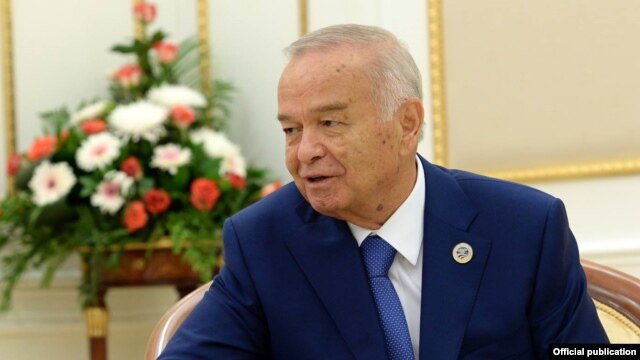Uzbek cabinet says Karimov 'critical,' amid reports of his death
| Publisher | Radio Free Europe/Radio Liberty |
| Publication Date | 2 September 2016 |
| Cite as | Radio Free Europe/Radio Liberty, Uzbek cabinet says Karimov 'critical,' amid reports of his death, 2 September 2016, available at: https://www.refworld.org/docid/57db9a76c.html [accessed 2 June 2023] |
| Disclaimer | This is not a UNHCR publication. UNHCR is not responsible for, nor does it necessarily endorse, its content. Any views expressed are solely those of the author or publisher and do not necessarily reflect those of UNHCR, the United Nations or its Member States. |
Last updated (GMT/UTC): 02.09.2016 08:27
By RFE/RL
 Uzbekistan's cabinet announced on September 2 that President Islam Karimov is in "critical" condition after suffering a stroke.
Uzbekistan's cabinet announced on September 2 that President Islam Karimov is in "critical" condition after suffering a stroke.
Uzbekistan's cabinet says President Islam Karimov is in critical condition after having a stroke, while Reuters quotes three unnamed diplomatic sources as saying that Karimov has died.
"Yes, he has died," one of the sources told Reuters.
The statement by the cabinet was carried on September 2 by Uzbekistan's official newspaper, Halq Sozi (People's Word), and was posted on the cabinet's website.
It said Karimov was hospitalized on August 24 and that in the past 24 hours his condition "saw a sharp deterioration and is considered critical by the doctors."
The statement was the first official word on Karimov since the cabinet announced on August 28 that he had been hospitalized, without saying what was wrong. His daughter said on Instagram the next day that he had suffered a brain hemorrhage.
Uzbekistan celebrated Independence Day on September 1, with Karimov absent. The prolonged official silence had set off speculation that the 78-year-old had died.
Some unconfirmed and unattributed media reports claimed that Karimov had passed away on August 29.
Meanwhile, Reuters reports that Kazakh President Nursultan Nazarbaev will cut short a trip to China and fly to Uzbekistan on September 3.
Adding to the speculation, streets in the center of Karimov's native city of Samarkand were blocked off as cleaning and apparent construction work were taking place on a central square late on September 1.
There was also activity around the Chorraha Mosque in Samarkand.
Security sources told RFE/RL's Uzbek Service that Prime Minister Shavkat Mirziyaev had made a trip to the city.
In Karimov's absence, Mirziyaev led a commemorative event in Tashkent on August 31 that marked the start of Independence Day celebrations.
Karimov has not been seen in public since mid-August.
But Lola Karimova-Tillyaeva, Karimov's younger daughter, suggested via social media on August 31 that her father was alive and could potentially recover.
Uzbekistan's tightly controlled state media until September 2 had not mentioned Karimov's illness, and it remains unclear who is currently in charge of the Central Asian nation of around 30 million.
However, two days of public ceremonies have been scaled back and scheduled appearances by Karimov, who issued the Uzbek declaration of sovereignty 25 years ago and has ruled ever since, have been canceled.
An Independence Day speech traditionally delivered by Karimov was read out by a state television anchor during an evening news bulletin on August 31.
The message was read out in the first person as if written by Karimov, in what appeared to be an effort to indicate that he remains in charge. The presenter made no mention of Karimov's condition.
'Everything Is Calm'
Some Uzbek citizens, crossing the border into Kyrgyzstan on August 31, said they were unaware of Karimov's illness.
Two women traveling with their children from the eastern Uzbek city of Andijon told RFE/RL's Current Time that "we know nothing about it. Everything is calm where we live."
Karimov has no apparent successor, and observers suggest any such decision would likely be made within the Uzbek president's tight inner circle.
Mirziyaev, who has been prime minister since 2003, is seen as a possible successor, as are Finance Minister Rustam Azimov and National Security Committee head Rustam Inoyatov.
International rights watchdogs and Western officials accuse Karimov of brutally suppressing perceived political opponents, and the country has never held an election deemed democratic by Western monitors.
The Uzbek Constitution states that, if the president is unable to perform his duties, the head of the upper chamber of parliament, the Senate, assumes presidential authority for a period of three months.
No public comments have come from Senate Chairman Nigmatulla Yuldashev, who has led the upper house since January 2015.
With reporting by RFE/RL's Uzbek Service, RFE/RL's Current Time TV, Reuters, AP, AFP, TASS, Gazeta.uz, and Interfax
Link to original story on RFE/RL website
